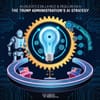US Vice President JD Vance recently addressed a global summit on artificial intelligence in Paris, emphasizing the Trump administration's commitment to keeping AI development in the US "free from ideological bias". Vance warned that excessive regulation of AI could stifle innovation, deterring risk-taking and slowing progress in the industry.
This stance highlights the divide between the US and Europe on AI governance. While the US promotes a hands-off, pro-innovation policy, Europe is pushing for stricter AI regulations and boosting public investment in the sector. China, meanwhile, is rapidly expanding its AI capabilities through state-backed tech giants, seeking global leadership in AI standard-setting.
The debate over AI regulation comes as nations grapple with the technology's rapid evolution and potential risks. Some experts, like Admiral Pierre Vandier, NATO's top modernization strategist, caution that AI could spiral out of control if left unchecked. Others, like Elon Musk, are making significant investments in AI, with a recent $97.4 billion bid to acquire OpenAI.


